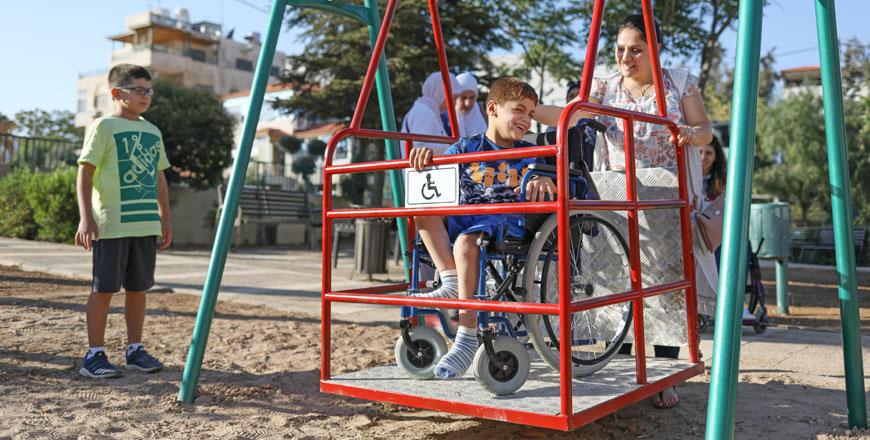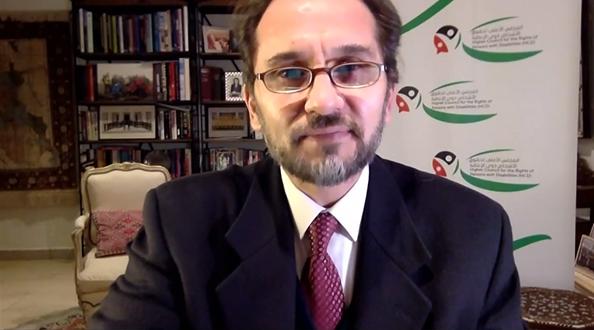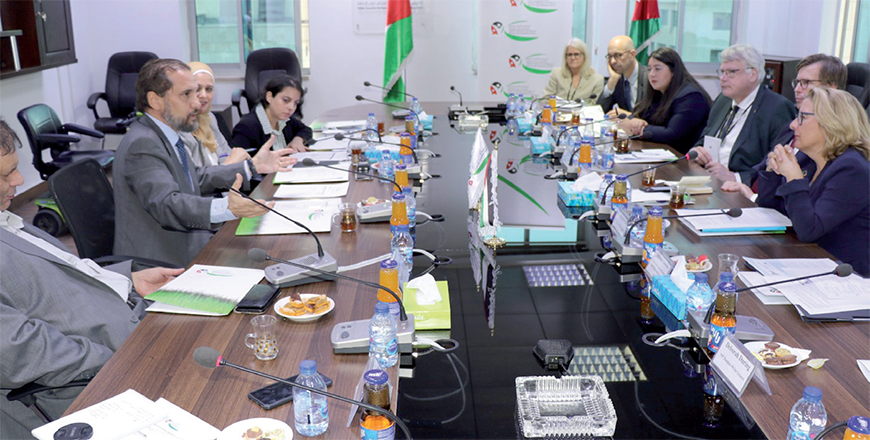You are here
Jordan’s law on rights of people with disability recognised at global summit
By Camille Dupire - Aug 01,2018 - Last updated at Aug 02,2018

As part of national efforts to improve inclusion and accessibility for persons with disabilities, Jordan recently witnessed the installation of the first wheelchair accessible swing (Photo by Emily Nevils)
AMMAN — Jordan’s efforts to improve inclusivity and accessibility for people with disabilities were recently recognised by the international community, as government officials were invited to participate in the Global Disability Summit 2018 (GDS18) in London.
An international event co-hosted by the UK Department for International Development (DFID) and the International Disability Alliance (IDA), the GDS18 aimed at “raising global attention on a long-neglected area, mobilising new global and national commitments on disability inclusion and showcasing good practice”, according to the organisers’ website.
“Jordan’s invitation to this summit is a clear sign that we are doing remarkable progress with a noticeable impact in Jordan and the region as a whole,” said Muhannad Azzeh, secretary general of the Higher Council for the Affairs of Persons with Disabilities (HCD), which he represented at the event, alongside delegations from the ministries of education and social development.
“This invitation is a global recognition of the first inclusive, anti-discriminatory law in the region, which came into force in September 2017, providing a broadened definition of disability and various advancements in the legal, societal and economic fields,” Azzeh told The Jordan Times over the phone, stressing “this is also a proof that our efforts are making a remarkable impact in the region.”
The Jordanian delegation outlined the coordinated efforts of various stakeholders in finalising a 10-year plan to make Jordan fully accessible and inclusive by 2027, as well as recent achievements such as Penal Code amendments which included an aggravating factor for crimes against people with disabilities, or the inclusion of the concept of “informed consent”, which gives citizens with disabilities the right to decide for themselves after receiving enough information about the consequences of each of their decisions.
Deemed by experts as the “most advanced” law in the region, the Law on the Rights of Persons with Disabilities stipulates that the government should incorporate the needs and rights of people with disabilities in their programmes and plans, while intensifying the oversight system, especially in disability care centres.
Despite the lack of exact figures, the HCD estimates that 11 to 15 per cent of the population suffers from disabilities, amounting to over 1,100,000 people. Meanwhile, an estimated one billion people have a disability worldwide, of which 800 million live in developing countries, according to DFID.
“In this summit, we were able to shed light on the Kingdom’s commitment to building an inclusive society for all, in coordination with governmental entities; and I believe this invitation proves that the global community recognises how far we’ve come in terms of legal protection of persons with disabilities,” Azzeh said.
He cited the council’s cooperation with the Ministry of Social Development, which helped instutionalise care for people with disabilities, including refugee population; the Ministry of Education, which committed to enhancing inclusive education across all governorates; as well as the ministries of communication and labour and the private sectors, which worked to develop accessible services and locations around the country.
Commenting on the efforts exerted to support Jordan in becoming a society “more inclusive for children with disabilities”, Deputy Representative at UNICEF Jordan Ettie Higgins said “according to the last census, 11 per cent of people in Jordan have functional difficulties and face environmental and societal barriers to their active participation. With the start of the Syrian crisis, Jordan witnessed an increase in the number of people with disabilities and an estimated 30 per cent of Syrian refugees in Jordan have specific physical or intellectual needs”.
“Within any crisis-affected community, children and adults with disabilities are among the most marginalised, yet they often are excluded from humanitarian assistance. This is why UNICEF has been continuously working with its partners, including DFID and the government of Jordan, to ensure that every child can actively participate in society, free of stigma and discrimination, and fulfil their potential,” she told The Jordan Times in Amman, highlighting the opportunity of the disability summit in reaffirming Jordan’s commitment to all children.
Organised under the title “Beyond immediate needs: ensuring disability inclusion in protracted crises [lessons from Syria and the region]”, the summit aimed to be a “landmark celebration of the achievements and rights of people with disabilities”, and an event that “creates renewed action, partnership and accountability to deliver lasting change for people with disabilities around the world”.
“We want to ensure people with disabilities are consistently and systematically included in international development and humanitarian assistance,” the GDS18 website said, stressing that the summit seeks to “galvanise the global effort to address disability inclusion in the poorest countries in the world and act as the start point for major change on this neglected issue”.
Related Articles
AMMAN — The Higher Council for the Rights of Persons with Disabilities (HCD) on Wednesday convened in Amman the first preparatory meeting on
AMMAN — HH Prince Mired, President of the Higher Council for the Rights of Persons with Disabilities (HCD), on Saturday, announced that Jord
AMMAN — HH Prince Mired, lord chamberlain and president of the Higher Council for the Rights of Persons with Disabilities (HCD), has met at



















